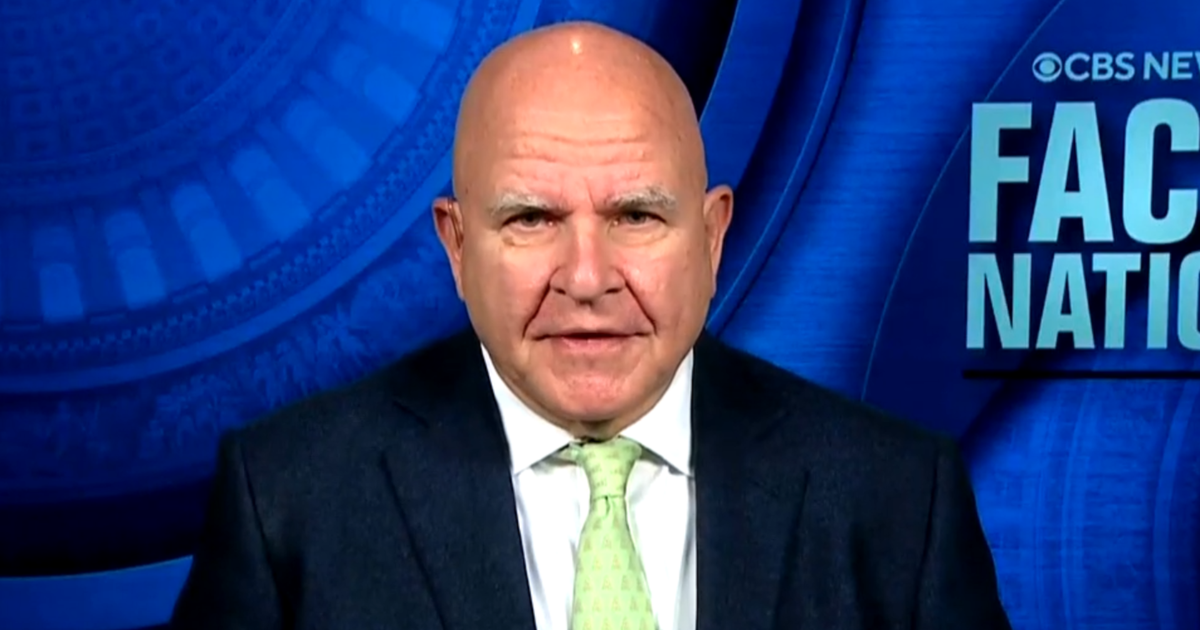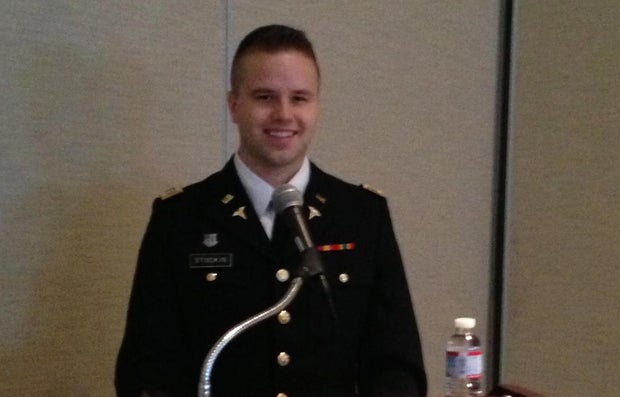CBS News
Subpoena for CBS News interviews “sends a chilling message” to victims in sexual abuse case against Army doctor, advocates say

Advocates for victims of sexual assault are speaking out against an effort by lawyers for an Army doctor, accused of abusing more than 40 patients, to obtain unbroadcast footage of CBS News interviews with two of his accusers ahead of court martial proceedings against him.
The defense has demanded CBS News turn over unaired footage from interviews conducted with two retired soldiers who spoke to CBS News, with their faces in shadow and their identities protected, in a report that first aired on “CBS Mornings” in February. In the broadcast interviews, the two men described alleged misconduct that occurred under the guise of medical care from Maj. Michael Stockin.
“Survivors have already faced unimaginable trauma,” said Josh Connolly, senior vice president of the victims’ advocacy group Protect Our Defenders. “Their courage in sharing their stories should be met with unwavering support and protection, not further exposure and risk.”
Connolly said the subpoena seeking CBS News’ footage “risks undermining the trust and safety that survivors deserve, and it sends a chilling message to others who may be considering coming forward.”
CBS News reached out to the Army Office of Special Trial Counsel, which declined to comment, saying they have not seen the statement from Protect Our Defenders.
Stockin, an anesthesiologist at the pain management clinic at Madigan Army Medical Center on Joint Base Lewis-McChord, faces 47 counts of abusive sexual contact and five counts of indecent viewing under the Military Code of Justice, involving 41 alleged victims who were his patients, according to the Army. Stockin was arraigned on the charges in February.
The Army says that Stockin remains suspended from patient care but still has administrative duties at Madigan Medical Center in a non-clinical area. The trial in this case is scheduled for January 2025.
Stockin has entered a plea of not guilty.
In a statement to CBS News, Brad Simon, an attorney for Stockin, said that the defense is “entitled to all statements” from the alleged victims about their allegations.
“This evidence is vital for the Defense to properly prepare for trial and to ensure that Major Stockin’s rights are upheld. It’s unconstitutional to suggest that the Defense is not entitled to the statements made by the alleged victims themselves about their own allegations,” Simon said. “The victim advocates suggesting this denial of evidence wish to deny Major Stockin a fair trial and that should terrify every person who believes in the due process of law.”
An Army judge will hear arguments Thursday on the CBS News motion for the court to reject the defense’s demand for the unaired interview footage. In response, defense attorneys for Stockin are asking the judge in the case to deny that request, claiming “this evidence is vital to MAJ Stockin receiving a fair trial,” according to a court filing on the matter.
Both of the men who spoke with CBS News earlier this year have shared their allegations with military investigators and anticipate that they would eventually be publicly identified as victims at trial as part of the criminal case pending against Stockin. They spoke with CBS News with the condition that they not be identified, saying they feared retaliation. CBS News recorded the interviews in shadow and did not identify them by name in its broadcast.
In asking the military judge to throw out the subpoena, attorneys for CBS News argued the interviews with confidential sources should be protected under widely accepted reporter’s privilege and that the request was “nothing more than a fishing expedition.”
“That privilege protects journalists against the compelled disclosure of their confidential sources and unpublished newsgathering material, like the unpublished footage here that implicates CBS’s confidential sources,” wrote Michael Berry, an attorney representing CBS News.
In a court filing on the matter, prosecutors said, “There is nothing in the aired footage that indicates the alleged victims stated anything inconsistent with any prior statements. “
However, the government has requested the judge review the unaired footage in chambers “to discern the relevance, if any, of that footage.”
One of the men,who sought the doctor’s help on a referral to manage arthritis in his shoulders, said he was at first “very confused” by Stockin’s examination.
“Myself and Dr. Stockin were left alone in the room. He first checked my shoulders and then he asked me to stand up and to pull down my pants and lift up my gown,” he said. “Dr. Stockin, he was face level with my groin, and he started touching my genitals.”
The other, said he was sexually abused by Stockin on three occasions and described a similar experience of receiving what he called an “alternate assessment.” He said he struggled to understand why this visit was unlike any he had previously encountered with a physician.
“Even with my wife I couldn’t bring myself to talk through what happened,” he said, “It just felt very uncomfortable.”
In a statement to CBS News, Ryan Guilds, a civilian attorney who represents the men who were interviewed, said,”The Army has a trust problem with victims. And this doesn’t help.”
“The Government’s willingness to subpoena confidential anonymous victim interactions with the press is just the latest example of a military justice system that treats victims with ambivalence and disrespect – placing the burden on victims not just to come forward but to fight for their own privacy and justice,” Guilds said.
The government is “the only party with the authority to issue such subpoenas in courts-martial,” according to a filing by Stockin’s attorneys. In this case, the Army says that they served CBS News at the request of the defense, according to a court filing from CBS News.
The filing goes on to explain that Maj. Ryan Keeter from the prosecutor’s office told attorneys for CBS News that neither the defense nor the prosecuting teams know the identities of the alleged victims who spoke with CBS News, and that the defense was seeking the information to possibly raise questions in cross-examination about any inconsistencies in their statements.
“If journalists are routinely compelled to violate their assurances of confidentiality in response to subpoenas, their ability to credibly provide sources with confidentiality — and, hence, acquire information that can only be acquired with such assurances — will be seriously undermined and important reporting, like that here, may never reach the public,” Berry wrote.
CBS News
Former Israeli hostages released in truce 1 year ago call for action to release those still held

Former Israeli hostages who were freed from Hamas captivity during a week-long humanitarian pause in fighting exactly one year ago Sunday called for immediate action to secure a deal for the release of those still held.
The only truce in the ongoing Israel-Hamas war on Nov. 24, 2023 – fewer than two months after fighting began – led to the release of 80 Israelis held by militants in Gaza. They were freed in exchange for 240 Palestinians detained in Israeli jails.
Repeated efforts since then by mediators from Qatar, Egypt and the United States to secure another truce and hostage release have failed. Qatar early this month said it was suspending its mediation role until the warring sides show “seriousness.”
Mostafa Alkharouf/Anadolu via Getty Images
Gabriella Leimberg was kidnapped during the Oct. 7, 2023, Hamas attack and was released along with her daughter, Mia, and sister Clara.
“For 53 days, the one thing that kept me going is that we, the people of Israel, the Jewish people, sanctify life — we don’t leave anyone behind,” she said.
Leimberg added: “Everything has already been said and now action is required. We don’t have any more time.”
Around 100 hostages are still in Gaza, and at least a third are believed to be dead.
“I survived and I was fortunate to get my entire family back,” Leimberg said. “I want and demand this for all the families of the hostages.”
Hamas wants Israel to end the war and withdraw all troops from Gaza. Israel has offered only to pause its offensive.
The Palestinian death toll from the war surpassed 44,000 this week, according to Gaza’s Health Ministry, which does not distinguish between civilians and combatants in its count.
Maya Alleruzzo / AP
Danielle Aloni, who was kidnapped with her five-year-old daughter, Emelia, and freed after 49 days, spoke at the ceremony of the “increasing danger” those still being held face every day.
She said those still in captivity “suffer physical, sexual, and psychological abuse, their identity and dignity crushed anew each day”.
“It took the Israeli government about two months to secure a deal for me and 80 other Israeli hostages. Why is it taking over a year to reach another deal to free them from this hell?” asked Aloni, whose brother-in-law, David Cunio, and his brother, Ariel Cunio, are still being held.
She emphasized that, even though she and the other hostages gained their freedom a year ago, “we haven’t really left the tunnels,” — referring to Hamas’ underground tunnels where many of the hostages were held.
“The feeling of suffocation, the terrible humidity, the stench — these sensations still envelop us,” Aloni said.
“If people could truly understand what it means to be held in subhuman conditions in tunnels, surrounded by terrorists for 54 days — there’s no way they would allow hostages to remain there for 415 days!” said Raz Ben Ami, who was released in the deal a year ago.
Her husband, Ohad, is still among those being held.
Ben Ami called for a ceasefire to “bring back all the hostages as quickly as possible”.
CBS News
Couple charged for allegedly stealing $1 million from Lululemon in convoluted retail theft scheme

A couple from Connecticut faces charges for allegedly taking part in an intricate retail theft operation targeting the apparel company Lululemon that may have amounted to $1 million worth of stolen items, according to a criminal complaint.
The couple, Jadion Anthony Richards, 44, and Akwele Nickeisha Lawes-Richards, 45, were arrested Nov. 14 in Woodbury, Minnesota, a suburb of Minneapolis-St. Paul. Richards and Lawes-Richards have been charged with one count each of organized retail theft, which is a felony, the Ramsey County Attorney’s Office said. They are from Danbury, Connecticut.
The alleged operation impacted Lululemon stores in multiple states, including Minnesota.
“Because of the outstanding work of the Roseville Police investigators — including their new Retail Crime Unit — as well as other law enforcement agencies, these individuals accused of this massive retail theft operation have been caught,” a spokesperson for the attorney’s office said in a statement on Nov. 18. “We will do everything in our power to hold these defendants accountable and continue to work with our law enforcement partners and retail merchants to put a stop to retail theft in our community.”
Both Richards and Lawes-Richards have posted bond as of Sunday and agreed to the terms of a court-ordered conditional release, according to the county attorney. For Richards, the court had set bail at $100,000 with conditional release, including weekly check-ins, or $600,000 with unconditional release. For Lawes-Richards, bail was set at $30,000 with conditional release and weekly check-ins or $200,000 with unconditional release. They are scheduled to appear again in court Dec. 16.
Prosecutors had asked for $1 million bond to be placed on each half of the couple, the attorney’s office said.
Richards and Lawes-Richards are accused by authorities of orchestrating a convoluted retail theft scheme that dates back to at least September. Their joint arrests came one day after the couple allegedly set off store alarms while trying to leave a Lululemon in Roseville, Minnesota, and an organized retail crime investigator, identified in charging documents by the initials R.P., recognized them.
The couple were allowed to leave the Roseville store. But the investigator later told an officer who responded to the incident that Richards and Lawes-Richards were seasoned shoplifters, who apparently stole close to $5,000 worth of Lululemon items just that day and were potentially “responsible for hundreds of thousands of dollars in loss to the store across the country,” according to the complaint. That number was eventually estimated by an investigator for the brand to be even higher, with the criminal complaint placing it at as much as $1 million.
Richards and Lawes-Richards allegedly involved other individuals in their shoplifting pursuits, but none were identified by name in the complaint. Authorities said they were able to successfully pull off the thefts by distracting store employees and later committing fraudulent returns with the stolen items at different Lululemon stores.
“Between October 29, 2024 and October 30, 2024, RP documented eight theft incidents in Colorado involving Richards and Lawes-Richards and an unidentified woman,” authorities wrote in the complaint, describing an example of how the operation would allegedly unfold.
“The group worked together using specific organized retail crime tactics such as blocking and distraction of associates to commit large thefts,” the complaint said. “They selected coats and jackets and held them up as if they were looking at them in a manner that blocked the view of staff and other guests while they selected and concealed items. They removed security sensors using a tool of some sort at multiple stores.”
CBS News contacted Lululemon for comment but did not receive an immediate reply.
CBS News
Former Trump national security adviser says next couple months are “really critical” for Ukraine

Washington — Lt. Gen. H.R. McMaster, a former national security adviser to Donald Trump, said Sunday that the upcoming months will be “really critical” in determining the “next phase” of the war in Ukraine as the president-elect is expected to work to force a negotiated settlement when he enters office.
McMaster, a CBS News contributor, said on “Face the Nation with Margaret Brennan” that Russia and Ukraine are both incentivized to make “as many gains on the battlefield as they can before the new Trump administration comes in” as the two countries seek leverage in negotiations.
With an eye toward strengthening Ukraine’s standing before President-elect Donald Trump returns to office in the new year, the Biden administration agreed in recent days to provide anti-personnel land mines for use, while lifting restrictions on Ukraine’s use of U.S.-made longer range missiles to strike within Russian territory. The moves come as Ukraine marked more than 1,000 days since Russia’s invasion in February 2022.
Meanwhile, many of Trump’s key selection for top posts in his administration — Rep. Mike Waltz for national security adviser and Sens. Marco Rubio for secretary of state and JD Vance for Vice President — haven’t been supportive of providing continued assistance to Ukraine, or have advocated for a negotiated end to the war.
CBS News
McMaster said the dynamic is “a real problem” and delivers a “psychological blow to the Ukrainians.”
“Ukrainians are struggling to generate the manpower that they need and to sustain their defensive efforts, and it’s important that they get the weapons they need and the training that they need, but also they have to have the confidence that they can prevail,” he said. “And any sort of messages that we might reduce our aid are quite damaging to them from a moral perspective.”
McMaster said he’s hopeful that Trump’s picks, and the president-elect himself, will “begin to see the quite obvious connections between the war in Ukraine and this axis of aggressors that are doing everything they can to tear down the existing international order.” He cited the North Korean soldiers fighting on European soil in the first major war in Europe since World War II, the efforts China is taking to “sustain Russia’s war-making machine,” and the drones and missiles Iran has provided as part of the broader picture.
“So I think what’s happened is so many people have taken such a myopic view of Ukraine, and they’ve misunderstood Putin’s intentions and how consequential the war is to our interests across the world,” McMaster said.
On Trump’s selections for top national security and defense posts, McMaster stressed the importance of the Senate’s advice and consent role in making sure “the best people are in those positions.”
McMaster outlined that based on his experience, Trump listens to advice and learns from those around him. And he argued that the nominees for director of national intelligence and defense secretary should be asked key questions like how they will “reconcile peace through strength,” and what they think “motivates, drives and constrains” Russian President Vladimir Putin.
Trump has tapped former Rep. Tulsi Gabbard to be director of national intelligence, who has been criticized for her views on Russia and other U.S. adversaries. McMaster said Sunday that Gabbard has a “fundamental misunderstanding” about what motivates Putin.
More broadly, McMaster said he “can’t understand” the Republicans who “tend to parrot Vladimir Putin’s talking points,” saying “they’ve got to disabuse themselves of this strange affection for Vladimir Putin.”
Meanwhile, when asked about Trump’s recent selection of Sebastian Gorka as senior director for counterterrorism and deputy assistant to the president, McMaster said he doesn’t think Gorka is a good person to advise the president-elect on national security. But he noted that “the president, others who are working with him, will probably determine that pretty quickly.”











